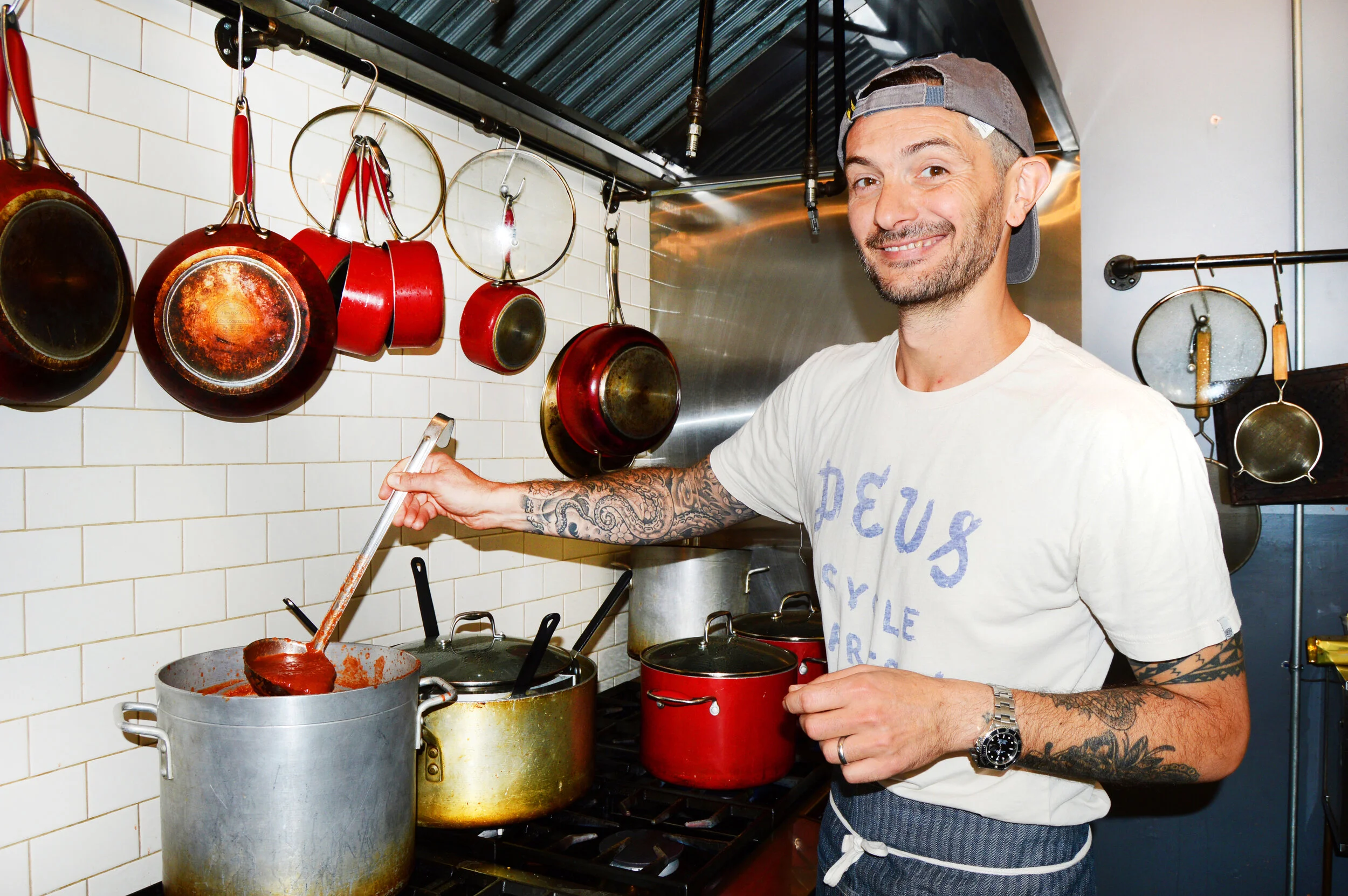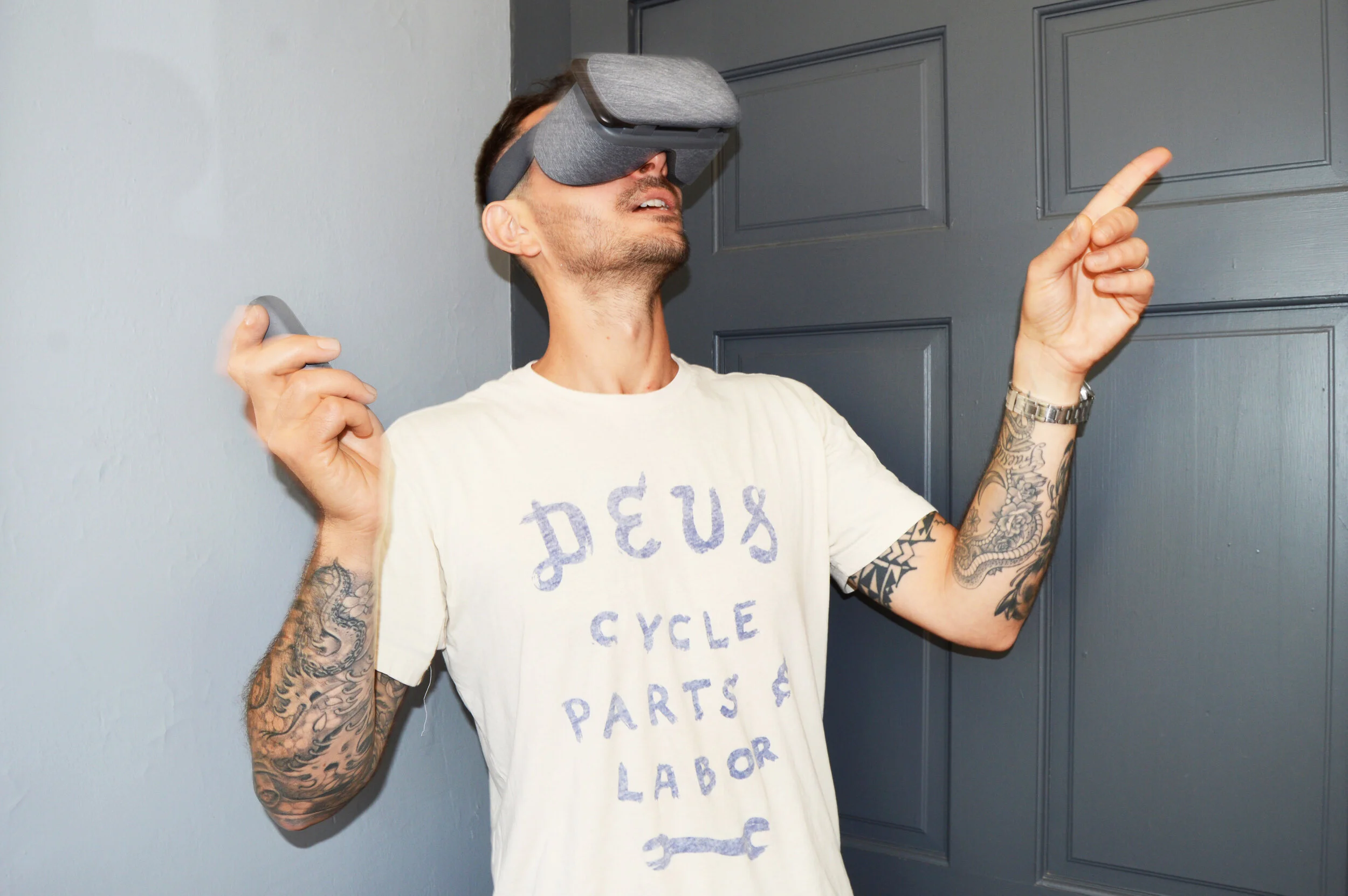Futuristic Cooking Lessons With Gabriele Corcos In Virtual Reality
Gabriele Corcos in The Tuscan Gun's kitchen in Brooklyn, New York. Photo: Nina Roberts
Published in Forbes on September 27, 2017
“I consider myself a bit of a visionary,” says Gabriele Corcos, the co-owner of The Tuscan Gun, a casual storefront Italian café in Brooklyn’s residential Windsor Terrace neighborhood. “To the degree that I often end up shooting myself in the foot,” he adds laughing, “I’m always too early.”
Inside The Tuscan Gun, periodic chopping and grinding come from the cooks in the open kitchen; old soul classics play on the sound system. Corcos, wearing jeans and t-shirt, gives an example of being “too early.” He began posting a series of Italian “how to” cooking videos on YouTube in the mid-2000s when it was a new platform.
The series titled Under The Tuscan Gun starred Corcos and his wife, actress Debi Mazar who can be seen in HBO's Entourage and the Scorsese classic Goodfellas, among other productions. These unadorned videos were shot in Corcos and Mazar's Los Angeles kitchen; their charming repartee continues throughout the series—with occasional hints of bawdy humor—as they prepare Bolognese sauce, pasta e fagioli, minestrone, even limoncello and other Italian delights.
“People were calling the house, begging my wife to ask me to go get a real job, that I wasn’t going anywhere,” recalls Corcos of his foray into early YouTube video posting, “that nobody would notice the project, there was no money there to be made.”
However, Corcos’s vision and efforts paid off. The series developed a following and eventually landed the couple a show on the Cooking Channel called Extra Virgin, which ran from 2010 to 2015. “We became somewhat of a global couple,” says Corcos, noting the Cooking Channel’s wide distribution in 85 countries. Their cookbook of the same name published in 2014 sold 90,000 copies according to Corcos.
Corcos wonders if he’s “too early” once again, this time utilizing the virtual reality experience. “I pride myself on always being tech-savvy,” says Corcos as natural light floods the cafe, back lighting a prized Ducati motorcycle on display in the window. But Corcos admits his embrace of VR is recent, “this was one of the things that I still hadn’t approached.”
His interest in VR was piqued when Gordon Meyer, a neighborhood Tuscan Gun customer who works at the VR company YouVisit, showed Corcos several demos. Corcos was dazzled by the immersive, interactive experience; one is easily transported from atop Machu Picchu in Peru to poking around the minimalist Atelier Swarovski Home in its creamy palette featuring crystal pieces.
They partnered to create a short VR experience called Super Tuscan: A Cooking Lesson with Chef Gabriele Corcos. It’s currently viewable in 360 on all desktops; the downloadable VR apps are slated for an October release.
Gabriele Corcos wearing a pair of VR glasses at The Tuscan Gun. Photo: Nina Roberts
Inside Corcos’s VR experience the viewer can watch his entertaining cooking lessons that take place inside the Tuscan Gun’s open kitchen. Corcos speaks off the cuff as he muddles mint leaves for his special grappa cocktail “The Conga,” prepares saffron broth for pasta al vino and tops a farro salad with “flavor bombs,” small roasted tomatoes. It’s easy to zoom in, inches from a sizzling pan of pork, or zoom out and mosey around café. Unlike a cooking lesson on TV, there is no fixed view chosen by the production team.
Clicking on various floating icons or objects lead to recipe cards and his other cooking lessons. The most revolutionary aspect of the VR experience to Corcos is the combination of immersive entertainment and commerce. The new cookbook Corcos and Mazar co-wrote Super Tuscan is propped up on a table; if clicked on, the viewer is led to an Amazon page where it can be purchased.
“I do see the future of commerce being the intersection of entertainment and the discovery of products,” says Corcos, clarifying, “items to purchase.” Massive retailers are indeed experimenting with VR, from Alibaba and Ikea to Ebay and Audi, either for promotional purposes or actual purchases. However, these VR experiences feel predictable and cold.
Corcos is anything but predictable and cold. He sports arm tattoos, is a Ducati rider enthusiast and avid family man. He uses profanities quite liberally when stressing a point. While giving his cooking lessons he cracks a few jokes and taps into his Florentine charm; his uniform on and off camera seems to be jeans and a t-shirt. At the same time, behind the scenes he unapologetically throws around “my brand” and “my demographics” among other marketing terms when talking business.
This first foray into VR is a good beginning, but Corcos wants to embark on bigger, more ambitious projects. Why not have an entertaining VR cooking show coupled with the ability to let viewers click on a sauté pan or espresso machine to purchase? Corcos also envisions hosting VR visits to Italian resorts, castles or landmark restaurants, helping Italy’s tourism industry. This fusion of entertainment and commerce has been dubbed “entertainmerce.”
Today’s mobile VR headsets, basically souped-up smartphone holders, like Google Daydream View and Samsung Gear VR, cost $70 to $100 and provide decent VR experiences. It remains to be seen if the average consumer will download and watch a cooking show app through their VR glasses and buy products.
Corcos learned about all aspects of food and cooking from his grandmother and mother, growing up on a farm in Fiesole, Italy, outside Florence. He never thought of food as a career—he’d traveled the world as a percussionist—until he landed in Los Angeles in 2001, “chasing love,” his wife Mazar. He’d met her in Florence while helping to produce a Katia Labèque recording session; Madonna dropped by with her pal Mazar.
In those early Los Angeles days Corcos discovered that Angelinos' Italian food options were either “extremely upscale or sh—t,” as Corcos puts it, “with no in between.” Pay $17 for a plate of pasta? “For $17 I could make a dinner for six people," claims Corcos, “if it’s done the right way.”
This enormous void was the impetus for Corcos to start posting on YouTube. His goal was to educate the average American about quality ingredients, simple preparation and how excellent, homemade food enhances all aspects of life, from health to family relationships.
Wanting to be closer to Italy and preferring New York City’s more direct style of communication, especially in business, Corcos and Mazar moved to Brooklyn two years ago. “The people have the guts to tell you ‘f—ck off’ to your face,” says Corcos in delight of New Yorkers, as opposed to what he found in L.A. “I find it really helpful for the business," he adds, "you don’t lose time.”
They opened The Tuscan Gun in their own Windsor Terrace neighborhood in 2015; it’s open for breakfast, lunch and ticketed weekend dinners. Corcos pops in and out all day, he considers the space more of a test kitchen, home base for upcoming projects and see customers who become friends, than a restaurant.
Corcos gets periodic offers to launch big, commercial restaurants across the East River in Manhattan, but he has zero interest, “I’m not in the business of turning tables.” He appreciates spending time with his family and believes the creative possibilities of VR are way more exciting.
While Corcos might be “too early” once again experimenting with VR, he feels the same way he did when he first started posting videos on YouTube. “I’m onto something,” states Corcos, “I believe in it and I know it’s going to work.”

